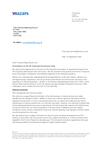Mazars' response to the FRC consultation on changes to the Corporate Governance Code
The key changes to the Code included:
- A requirement for Company Boards to make a statement in the Annual Report on the effectiveness of Risk Management and Internal Controls (overall controls, not just those relating to financial reporting), how they have assessed the effectiveness of controls, including what assurance has been obtained and whether any material weaknesses have been identified and any remediation plans.
- The audit committee takes on responsibility for narrative reporting, including sustainability and the addition of specific ESG matters, including climate ambitions and transition planning.
- Reporting is to be based on outcomes rather than processes.
- enhancements to requirements around diversity and inclusion, engagement and remuneration.
In our response, we highlighted some messages for the FRC to consider including:
- Reiterating our support for Board confirmation of the effectiveness of internal controls over wider operational and compliance risks in addition to those over financial reporting. However, we noted that it is likely there will be widespread disclosures where companies do not fully comply in the early years given the relative immaturity of such controls compared to those over financial reporting, and regulators and the market should recognise this is the case.
- The successful adoption of the Code is based on setting an appropriate scope of entities which should be subject to its requirements. There is significant complexity in current reporting requirements for listed and/or large companies which have developed over many years. Although a review of current arrangements is not entirely within the FRC’s control, the FRC should be mindful of the current reporting requirements when considering the appropriate threshold for application of the code, so as to avoid adding yet more complexity. It is important to consider the links, and consistency, between the requirements of very large companies set out in the recently proposed Statutory Instrument with those in the revised Code.
- The successful implementation of the revisions to the Code, in particular those relating to internal control, will rely heavily on high-quality guidance made available to companies from the outset of the adoption of the Code. This guidance needs to be scalable to enable companies to develop disclosures proportionate to their size and complexity, and to reflect the risks they are addressing.
- The ever-increasing requirements and expectations of Boards and Audit Committees in terms of time commitment, skills and knowledge may have the unintended consequence of reducing the number of potential candidates for Board roles. The FRC should consider how it can maintain the attractiveness of board roles through the adoption of a proportionate improvement-orientated regulatory regime.
- Although we broadly welcome the proposed changes to the Code, in the absence of high-quality guidance and practical examples to support implementation, boilerplate disclosures may remain prevalent, lessening the impact of the changes to the Code and the value of corporate governance reporting.
Paul Winrow, Audit Quality Support Partner, said:
We welcome the proposed changes to the Code, perhaps the most significant of which relate to internal controls. We support the requirement for Boards to confirm the effectiveness of wider internal controls, not just those over financial reporting. However, regulators and capital market participants should recognise that it may take time for these wider internal control systems to become fully effective and for some companies to report full compliance with the Code requirements. High-quality guidance will be critical to successful implementation and avoiding boilerplate disclosures.

